“16 Million people in Pakistan don’t have access to any form of sanitation services”
WaterAid, in collaboration with UNICEF and GIZ, observed the World Toilet in Islamabad
Islamabad(Imrana komal)
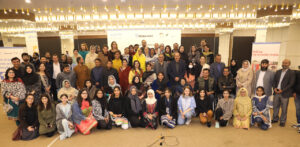
19 November is World Toilet Day, a day for us to celebrate the importance of toilets and sanitation, and to raise awareness of the fact that more than 16 Million people in Pakistan; including women, children, people with disabilities, people of old age, and other highly vulnerable groups; do not have access to any form of toilets and are forced to go out in the fields to defecate.
World Toilet Day aims to inspire action to tackle the global sanitation crisis and achieve Sustainable Development Goal (SDG) 6 and 8, which promises sanitation and water for all by 2030. This year, the official World Toilet Day theme is ‘Sanitation and Groundwater: ‘Making the invisible visible’. The campaign focuses on the impact of the sanitation crisis on groundwater and the urgent need to step up progress. Time is running out. We must make the invisible visible.
WaterAid, in collaboration with UNICEF and GIZ, observed the World Toilet in Islamabad. This event was complemented with similar activities hosted in all provinces of Pakistan with the collaboration of different academic institutes and civil society partners. The aim of this national drive was to raise awareness on the topic that is usually considered a taboo but is nonetheless of vital importance as noted by the speakers.
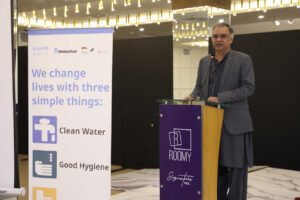
Mr. Arif Jabbar Khan, Country Director, WaterAid Pakistan highlighted the importance of safely managed systems to protect ground water. He stressed the need for research and accurate data to support informed policy development and planning. There is need for the government, civil society and businesses to work collectively to help achieve SDG-6 agenda and a special focus on safely managed sanitation in which Pakistan is lagging much behind.
Dr. Hifza Rasheed, Director General Pakistan Council of Research in Water Resources quoting a research, noted that, “For every dollar invested in Water and Sanitation, there is a $ 4.3 return in the form of healthcare cost and wellbeing”. She shared the water quality issues and trends and its link with health.
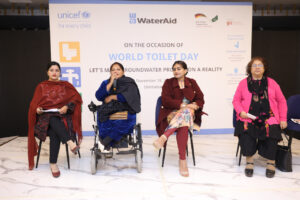
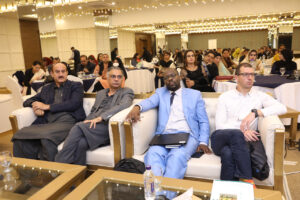
In her presentation, Ms. Rabia Baloch from GIZ informed the participants that like other provinces, Balochistan is affected by the global sanitation crisis. Nearly half of the schools do not have access to safe drinking water and 73% do not have access to any sanitary facilities. Sanitation for Millions works on improving the access to safely managed sanitation through the establishment of a concept for decentralized wastewater treatment systems, the improvement of operation and maintenance of sanitary facilities as well as the introduction of menstrual health & hygiene management and female-friendly toilets at public schools in the province.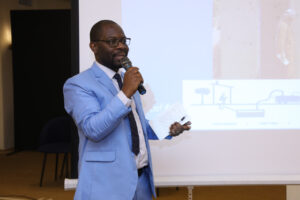
UNICEF presented its Sanitation game plan which is aligned with UN-Water SDG 6 Global Acceleration Framework— a unifying initiative designed to deliver fast results. It was noted that the vision is to work alongside with government and sector partners to achieve the shared ambition of safely managed sanitation for all. The Sanitation Game Plan aims to help governments achieve safely managed sanitation for their populations and meet the Sustainable Development Goals (SDGs) sanitation target. Through the Sanitation Game Plan, UNICEF will support 1 billion people gain access to safely managed sanitation, through direct and indirect support, in collaboration with partners.
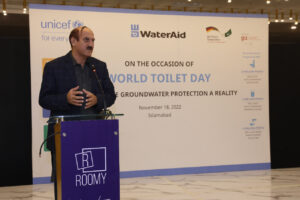
Mr. Sardar Khan Zimri, Deputy Director General, Water Management CDA delivered the keynote speech. He informed the participants that while the situation has improved this year, last year the water levels in Islamabad decreased by 75%. He believes this is an ongoing threat that will impact the population in the years to come if nothing is done. Safely managed sanitation systems are the need of the hour.
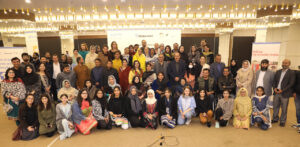
The participants including persons with disabilities, transgenders, women and girls and sector partners lamented the lack of WASH services in public areas (in public and private sector spaces) and demanded that government should address these concerns through the implementation and enforcement of laws and regulations. The participants agreed that collectively the public and private sector, through partnerships and collaboration needs to make WASH a development priority in their work going froward. The participants were taken to Saidpur Village to learn about the decentralized waste-water treatment system modeled by WaterAid Pakistan and formally handed over to Capital Development Authority for future operation and maintenance

